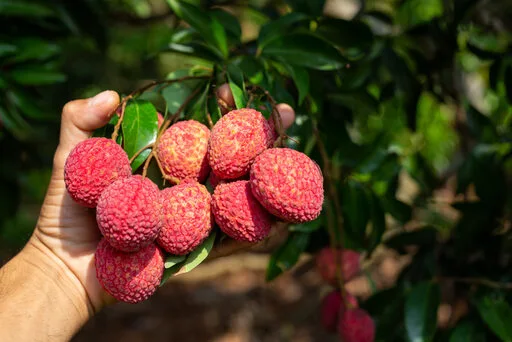Welcome to “good to best,” where we elevate your culinary adventures by “Exploring Exotic Food Fruits.” If you’ve ever craved a taste of something truly unique, this journey through the world of exotic fruits is just what you need. Imagine savoring the succulent sweetness of dragon fruit or the refreshing, jelly-like texture of rambutan. These fruits not only tantalize your taste buds but also bring an element of surprise and delight to your meals. Rooted in the rich culinary traditions of the Orient, these exotic food fruits are celebrated for their distinct flavors and nutritional benefits. Join us as we uncover the secrets of these extraordinary fruits, providing you with tips on how to incorporate them into your diet and elevate your food experiences. Embark on this exotic adventure with us and discover the vibrant world of food fruits that awaits you.
Table of Contents
1. Introduction to Exotic Food Fruits
Embarking on the journey of exploring exotic food fruits is like opening a treasure chest of flavors and aromas from around the world. These fruits, often overlooked in traditional grocery stores, offer a unique taste experience that can transform your culinary adventures. Imagine the vibrant colors, diverse textures, and intriguing shapes of fruits like dragon fruit, rambutan, and mangosteen. These exotic food fruits not only appeal to the senses but also bring a touch of mystery and excitement to your meals, inviting you to step out of your comfort zone and discover new favorite flavors.
- The Allure of the Unfamiliar
The allure of unfamiliar food is a powerful force that drives culinary exploration and innovation. Exotic food fruits exemplify this allure, enticing food enthusiasts with their unfamiliar shapes, colors, and flavors. For many, the first encounter with a spiky rambutan or a vibrant dragon fruit is an invitation to a new adventure. These fruits challenge our conventional taste preferences and introduce us to a world of diverse and often surprising flavors. The excitement of trying something new and the joy of discovering a delicious, previously unknown fruit is a reward in itself, making the journey into the exotic food realm truly worthwhile.
The unfamiliarity of exotic food fruits also sparks curiosity and a sense of wonder. Each fruit comes with its own story, often tied to ancient traditions and cultural practices. This connection to the unknown not only satisfies a culinary curiosity but also enriches our understanding of the world’s food heritage. By embracing the allure of these exotic food fruits, we open ourselves up to a wider spectrum of tastes and experiences that enhance our appreciation for the global food landscape.
- Cultural Significance and Origins
Exotic food fruits hold significant cultural value in many regions around the world, particularly in Oriental countries. Fruits like lychee, mango, and dragon fruit have been integral to local diets, celebrations, and traditions for centuries. In many Asian cultures, these fruits are not just food but symbols of prosperity, health, and good fortune. For instance, lychee is often associated with love and romance, and it is a common gift during festive seasons. Understanding the cultural significance of these exotic food fruits provides a deeper appreciation of their role beyond mere consumption.
The origins of these fruits are equally fascinating, often tied to specific climates and geographies that contribute to their unique characteristics. Mangosteen, known as the “queen of fruits,” hails from the tropical rainforests of Southeast Asia, where it thrives in the humid, nutrient-rich environment. The historical trade routes that introduced these fruits to different parts of the world also tell a story of cultural exchange and culinary fusion. By exploring the cultural significance and origins of exotic food fruits, we not only savor their flavors but also connect with the rich tapestry of global food heritage.
2. Top Exotic Food Fruits to Try
Exploring the realm of exotic food fruits opens up a world of vibrant flavors and unique culinary experiences. These fruits, often found in tropical and subtropical regions, offer a delightful escape from the ordinary. Among the top exotic food fruits to try are dragon fruit, rambutan, mango, and lychee. Each of these fruits brings its own distinctive taste and texture, promising to elevate your food adventures to new heights. From the visually striking dragon fruit to the sweet and juicy lychee, these exotic treats are sure to tantalize your taste buds and add a touch of the extraordinary to your diet.
Not only do these exotic food fruits provide exciting new flavors, but they also come packed with a host of nutritional benefits. Rich in vitamins, antioxidants, and essential nutrients, these fruits can contribute to your overall health and well-being. Incorporating them into your daily meals can be a delightful way to diversify your diet and ensure you’re getting a broad spectrum of nutrients. Whether you’re a seasoned food enthusiast or a curious novice, these top exotic food fruits are definitely worth trying.
- Dragon Fruit: A Tropical Delight
Dragon fruit, also known as pitaya, is a tropical food delight that captivates with its striking appearance and subtle, sweet flavor. This exotic fruit, which comes in vibrant pink or yellow skin with green scales, contains a white or red fleshy interior speckled with tiny black seeds. Its mildly sweet taste and refreshing texture make it a versatile addition to a variety of food dishes, from smoothies and salads to desserts. Dragon fruit’s visual appeal and unique flavor profile are sure to add an element of surprise and delight to your food experience.
Beyond its captivating appearance, dragon fruit is a nutritional powerhouse. Rich in vitamin C, antioxidants, and fiber, this exotic food fruit supports immune health and aids in digestion. Its high water content also makes it an excellent hydrating snack, especially during hot weather. Originating from Central America but widely grown in Southeast Asia, dragon fruit is celebrated in many Oriental cuisines for its health benefits and culinary versatility. Including dragon fruit in your diet can be a delicious and nutritious way to enhance your food repertoire.
- Rambutan: Nature’s Candy
Rambutan, often referred to as nature’s candy, is an exotic food fruit that offers a delightful burst of sweetness with every bite. Encased in a hairy, red shell, this tropical fruit reveals a translucent, juicy flesh that is reminiscent of lychee but with its own distinct flavor. Its sweet and slightly acidic taste makes it a refreshing treat that can be enjoyed on its own or added to various food dishes for an exotic twist. Rambutan is a beloved fruit in many Asian countries, where it is enjoyed both fresh and as part of traditional desserts.
In addition to its delicious taste, rambutan is packed with essential nutrients. It is a good source of vitamin C, which boosts the immune system, and also contains a range of minerals such as iron, calcium, and phosphorus. The fruit’s high water content makes it hydrating, while its fiber content aids in digestion. Exploring rambutan as part of your food journey not only introduces you to new flavors but also provides a healthy, nutritious snack that supports overall well-being.
- Mango: The King of Fruits
Mango, often crowned as the king of fruits, is a tropical food marvel renowned for its luscious taste and versatility. This juicy fruit, with its golden-yellow flesh, offers a sweet and tangy flavor that can enhance a wide array of food dishes. From smoothies and salsas to salads and desserts, mango’s rich taste and smooth texture make it a favorite in many culinary traditions, particularly in South Asian and Southeast Asian cuisines. The mango’s irresistible flavor and widespread appeal make it a must-try for anyone exploring exotic food fruits.
The nutritional benefits of mango further enhance its status as a top exotic food fruit. Rich in vitamins A and C, as well as antioxidants and dietary fiber, mango supports immune health, skin health, and digestion. Its high content of natural sugars provides a quick energy boost, making it a perfect snack for any time of day. Incorporating mango into your diet not only satisfies your taste buds but also contributes to a balanced and healthy food regimen.
- Lychee: A Juicy Gem
Lychee, often described as a juicy gem, is a small but immensely flavorful exotic food fruit that hails from China. Encased in a rough, red shell, lychee reveals a translucent, juicy flesh that is both sweet and slightly floral in taste. This delicate balance of flavors makes lychee a cherished addition to many food dishes, from fruit salads and desserts to beverages. Its unique taste and refreshing quality provide a delightful contrast to more common fruits, adding a touch of elegance to your culinary explorations.
Beyond its delightful flavor, lychee is packed with nutritional benefits. It is an excellent source of vitamin C, providing a significant boost to the immune system. Additionally, lychee contains antioxidants, fiber, and essential minerals such as potassium and magnesium, which contribute to overall health and well-being. Incorporating lychee into your food repertoire not only introduces a unique and delicious flavor but also supports a nutritious and balanced diet.

3. Health Benefits of Exotic Food Fruits
Exploring exotic food fruits introduces new flavors and offers numerous health benefits. Packed with vitamins, minerals, and antioxidants, these fruits support overall well-being. Incorporating them into your diet ensures a broad spectrum of nutrients, boosting your immune system and improving digestion. Exotic fruits also contain unique compounds with added benefits like anti-inflammatory properties. For instance, the high vitamin C in lychee and rambutan supports immune health and collagen production for healthy skin. These fruits provide delicious flavors and substantial health benefits, making them a valuable dietary addition.
- Nutritional Powerhouses
Exotic food fruits are often considered nutritional powerhouses due to their dense concentrations of essential vitamins and minerals. Fruits like mango, dragon fruit, and lychee are rich in vitamins A, C, and E, which are crucial for maintaining healthy skin, vision, and immune function. Additionally, these fruits provide a good source of dietary fiber, which aids in digestion and helps maintain a healthy weight. The nutritional richness of exotic food fruits makes them an excellent choice for anyone looking to enhance their diet with natural, nutrient-dense options.
In addition to vitamins and fiber, many exotic food fruits contain a variety of antioxidants, which help protect the body from oxidative stress and reduce the risk of chronic diseases. For instance, the antioxidants in dragon fruit, such as betalains and flavonoids, have been shown to have anti-inflammatory and anti-cancer properties. By incorporating these nutritional powerhouses into your food intake, you can enjoy not only their unique flavors but also their significant health benefits.
- Boosting Immunity and Wellness
One of the standout benefits of incorporating exotic food fruits into your diet is their ability to boost immunity and overall wellness. Fruits like rambutan, lychee, and dragon fruit are particularly high in vitamin C, a powerful antioxidant that plays a critical role in supporting the immune system. Regular consumption of these fruits can help protect against common illnesses like colds and flu by strengthening your body’s natural defenses. Additionally, the antioxidants present in these fruits help neutralize free radicals, reducing inflammation and promoting overall health.
Exotic food fruits also contribute to wellness by providing essential nutrients that support various bodily functions. For example, the potassium in mango and lychee helps regulate blood pressure and supports heart health, while the fiber content in these fruits aids in digestion and promotes a healthy gut. The combination of vitamins, minerals, and antioxidants found in exotic food fruits ensures that your body receives the nourishment it needs to function optimally. Including these fruits in your diet is a delicious and effective way to enhance your immunity and overall wellness, making them a valuable addition to your daily food intake.
4. Incorporating Exotic Fruits into Your Diet
Incorporating exotic food fruits into your diet diversifies your meals with vibrant colors, unique flavors, and essential nutrients. These fruits can transform ordinary dishes into extraordinary culinary experiences, enhancing breakfasts, lunches, and dinners with endless creativity. From smoothies and salads to main courses and desserts, there are countless ways to enjoy these nutritious fruits. Experimenting with exotic fruits, like adding dragon fruit to yogurt or mango to salsa, elevates your meals with refreshing twists and rich nutritional benefits, making them a perfect addition to any diet.
- Creative Recipes and Serving Ideas
Incorporating creative recipes and serving ideas into your food routine can elevate your enjoyment of exotic fruits. Start your day with a tropical smoothie bowl featuring dragon fruit, mango, and banana, topped with granola and coconut flakes for a vibrant, nutritious boost. For a zesty twist, try a fruit salad with lychee, rambutan, and pineapple dressed with lime juice and mint. Savory dishes can also benefit from these fruits, such as a spicy mango salsa with grilled chicken or fish, or a salad of mixed greens, avocado, and dragon fruit. Dessert lovers can indulge in lychee sorbet or rambutan pudding for a sweet, exotic treat. These inventive ideas make it easy to regularly incorporate exotic fruits into your diet, enhancing both flavor and nutrition.
- Selecting and Storing Exotic Fruits.
Selecting and storing exotic fruits properly is crucial to enjoy their full flavor and nutritional benefits in your food. Choose firm, brightly colored fruits free from blemishes, like a slightly soft ripe mango or a heavy dragon fruit with vibrant skin. Store dragon fruit and rambutan in the refrigerator, while keeping mango and lychee at room temperature until ripe, then refrigerate. Following these tips ensures your exotic fruits stay fresh and delicious, enhancing your culinary creations.
- Where to Find Exotic Fruits
Finding exotic food fruits can be an adventure, often available in specialty stores, farmers’ markets, and online retailers. Asian grocery stores are excellent for discovering lychee, rambutan, and dragon fruit, sourced directly from their origins and offering an authentic shopping experience. Farmers’ markets are great, especially in summer, for tropical fruits in season. Online retailers and subscription boxes also deliver fresh, high-quality exotic fruits to your doorstep, making it easy to incorporate these unique flavors into your diet and enhance your food adventures.
5. Cultural Insights and Traditions
Exotic food fruits are more than just delicious; they are deeply woven into the cultural fabric of many societies, especially in Oriental regions, holding significant symbolic meanings and integral roles in traditions and rituals. Understanding these cultural contexts enhances your appreciation and offers a richer food experience. For instance, in traditional Chinese medicine, lychee is believed to bring good fortune and health, while in Southeast Asia, mango symbolizes love and fertility. Exploring these cultural insights reveals how these fruits transcend mere food, embodying heritage and community.
- Exotic Fruits in Oriental Cuisine
Exotic food fruits play a pivotal role in Oriental cuisine, adding unique flavors and textures that define many traditional dishes. In Chinese cuisine, lychee is often used in desserts and beverages, adding a sweet and floral note that complements various flavors. Dragon fruit, with its striking appearance and subtle taste, is commonly used in fruit salads and as a garnish in Thai and Vietnamese dishes, enhancing the visual appeal and taste of the food. The integration of these fruits in Oriental cuisine showcases the creativity and diversity of food traditions in the region.
Mango, revered as the king of fruits, is a staple in many South Asian cuisines. It is used in a variety of dishes, from the popular mango sticky rice in Thailand to refreshing mango lassi in India. These dishes highlight the versatility of mango, demonstrating how its rich, sweet flavor can enhance both savory and sweet food preparations. Incorporating exotic fruits into Oriental cuisine not only preserves traditional flavors but also celebrates the rich culinary heritage that these fruits embody.
- Celebrations and Festivals Featuring Exotic Fruits
Exotic food fruits often take center stage in numerous celebrations and festivals across the Orient, symbolizing prosperity, health, and happiness. During the Chinese New Year, fruits like lychee and mandarin oranges are given as gifts and used in rituals to attract good fortune and ward off negative energy. These fruits are carefully selected for their auspicious colors and shapes, reflecting cultural beliefs that associate them with prosperity and well-being. Such traditions underscore the importance of food in cultural practices and the symbolic meanings attached to exotic fruits.
In Thailand, the annual Mango Festival celebrates the country’s love for this prized fruit. The festival features a variety of mango-based dishes, competitions, and cultural performances, highlighting the fruit’s significance in Thai cuisine and culture. Similarly, the Mid-Autumn Festival in China and Vietnam features mooncakes filled with lotus seeds and fruit pastes, including exotic fruits, to celebrate the harvest season and family reunion. These festivals not only offer a chance to enjoy exotic food fruits but also provide a window into the cultural and communal aspects of food traditions. By participating in these celebrations, you can experience the rich tapestry of cultural practices that honor and enjoy these delightful fruits.
6. Conclusion
Exploring exotic food fruits is a journey through flavors, cultures, and culinary delights. From the tropical sweetness of mango to the juiciness of lychee, these fruits reveal the rich tapestry of global food diversity. They not only tantalize taste buds but also nourish the body with essential vitamins and antioxidants. Incorporating exotic fruits into your diet transforms meals, adding vibrancy and health benefits. Each fruit carries its own story and cultural significance, making every bite a journey of discovery. Embrace these fruits for culinary creativity, whether in new recipes or in their natural form, and let them enrich your food journey with their vibrant colors, unique textures, and diverse flavors.
7. Call To Action
Have you tried incorporating exotic food fruits into your diet? Share your thoughts and experiences with us – we’d love to hear how they’ve enhanced your culinary adventures!


















































